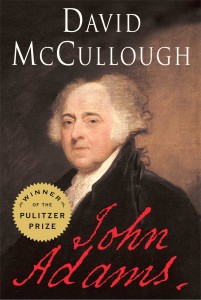John Adams is, in short, excellent. David McCullough’s tome is both a well-crafted narrative and a rich, historical account. In many ways, John Adams is a biography of the man in his own words. Throughout the book, McCullough draws heavily from Adams’ own writing. In fact, it is rare to find a page without several embedded quotations. Adams certainly left lots of material to draw on. He wrote vast numbers of letters throughout his lifetime and preserved his thoughts in a well-kept diary. The frequent use of Adams’ own writing engenders a feeling of closeness with the man, which would be difficult to achieve without McCullough’s extensive research. However, McCullough refused to blindly accept what Adams wrote. In one particularly amusing passage, McCullough explains how there were two, contrasting versions of how Jefferson came to be assigned the task of writing the Declaration of Independence. According to Jefferson, he was chosen unanimously by the committee. But according to Adams, Jefferson had initially suggested that he (Adams) should write it. As a gentleman, Adams refused to accept it, claiming that Jefferson was the better writer. Weighing these two versions, McCullough comes to the conclusion that if one of them was misremembering, it was probably Adams, for his “tone of … self-deprecation” was developed only in the later years of his life. Another fascinating moment where McCullough steps in to second guess his subject is while discussing the signing of the Declaration. Though it was passed on July 4, 1776, the document was not signed by all the delegates until August 2. This fact, however, was misremembered by both Adams and Jefferson, who “in old age…would both stubbornly and incorrectly insist that the signing took place on July 4.” In John Adams, David McCullough demonstrates his ability to distill vast amounts of research into a coherent narrative while allowing room for his own interpretation.
McCullough’s work draws the reader in to early America with detailed descriptions of setting and character. His lengthy depictions of setting anchor the narrative in an otherwise foreign time and place. For example, before writing about the Constitutional Convention, McCullough describes the city of Philadelphia, its climate, people, and history, for five pages. McCullough’s description of people is equally thorough; his careful attention to ordinary detail humanizes these distant figures. While describing Jefferson in London, McCullough writes that he went on a “shopping spree” buying both a “microscope” and “a satin ‘Florentine’ breeches.” In an exchange that transcends time, John and Abigail advise their son to study more and party less; McCullough writes that while “John Quincy required a warning against the perils of the midnight lamp, Charles needed reminding that such a lamp existed.” John Adams the patriot becomes John Adams the parent as he gently reprimands his son, writing “You have in your nature a sociability, Charles, which is amiable, but may mislead you.” McCullough’s thorough attention to detail made the book very enjoyable to read. He paints vivid pictures of character and place that are both enthralling and historically illuminating.
The book is especially valuable because it sheds new insight on the precise ideology of the founding father. A common criticism of Adams is that he was a defender of aristocracy and monarchy. It is thus surprising to learn that this allegation was, in fact, deeply offensive to Adams and far from the truth. McCullough’s book does a thorough job of elucidating the political philosophy of one of our greatest statesmen. He explains that John Adams believed men were only created equal morally and politically. Inevitably, he thought, a natural aristocracy will develop. In a pure democracy Adams wrote, these men would dominate the passions of the common people and become oligarchs. Thus, he reasoned that the interests of the natural aristocracy must be consigned to one branch of legislature, the Senate. This belief drew ire and condemnation from many sources. The Republican press began referring to Adams as “His Rotundity,” mocking both his supposed monarchism and his notable girth. All of this information about Adams’ political philosophy and unfortunate nick-name could be found with a bit of research. What makes McCullough’s book compelling is how he weaves these facts into an engaging historical narrative.
That, ultimately, is what makes John Adams truly great. David McCullough is a master story-teller. He deliberately chooses to focus on all aspects of Adams’ life, not just the great political decisions for which he is known. One common theme that runs through the entire text is the enduring love between John and Abigail. They were each other’s “dearest friend.” David McCullough’s inclusion of block quotes from their letters is at times inspiring and heart-breaking. Often, while Adams was away in Europe on diplomatic missions, their letters would take two months to travel, if they ever completed the journey at all. It is telling that throughout all the epoch-making events in his life, Adams expressed a chronic desire to return to his farm in Massachusetts. John Adams wrote to his son John Quincy that the four years on his farm, which immediately followed his four years in office, were the best of his life.
McCollough’s John Adams is an extremely well written and highly engaging account of the founding father. McCullough’s propensity to quote from Adams’ own writing gives the book authority, while his skill as a story-teller makes it quite an enjoyable read. Discussion of the book’s themes in one review is difficult, because it is a story encompassing war, love, politics, and history. If any one of those piques interest, John Adams would be a good read.


Be the first to comment on "A Second Look at our Second President"